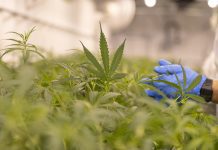
A new study has shown how cannabinoid signalling is vital for anxiety and stress levels.
According to the new study, a molecule produced by the brain that is involved in cannabinoid signalling activates the same receptors as cannabis, and is protective against stress by reducing anxiety-causing connections between two brain regions.
Researchers at Vanderbilt University Medical Center have shown that a molecule produced by the brain – 2-AG – that activates the same receptors as cannabis is protective against stress by reducing anxiety-causing connections between the two brain regions.
The researchers believe that the finding, published in Neuron, can help to explain why some people use cannabis when they are anxious or under stress.
It could also mean that pharmacologic treatments that increase levels of this molecule in the brain could regulate anxiety and depressive symptoms in people with stress-related anxiety disorders.
A collapse in the endocannabinoid system
The study showed that when mice are exposed to acute stress, a break in an anxiety-producing connection between the amygdala and the frontal cortex caused by 2-AG temporarily disappears, causing the emergence of anxiety-related behaviours.
Sachin Patel, the paper’s corresponding author and director of the Division of General Psychiatry at Vanderbilt University Medical Center, said: “The circuit between the amygdala and the frontal cortex has been shown to be stronger in individuals with certain types of anxiety disorders. As people or animals are exposed to stress and get more anxious, these two brain areas glue together, and their activity grows stronger together.
“We might predict there’s a collapse in the endocannabinoid system, which includes 2-AG, in the patients that go on to develop a disorder. But, not everyone develops a psychiatric disorder after trauma exposure, so maybe the people who don’t develop a disorder are able to maintain that system in some way. Those are the things we’re interested in testing next.”
Cannabinoid signalling
The study also found that signalling between the amygdala and the frontal cortex can be strengthened through genetic manipulations that compromise endogenous cannabinoid signalling in this pathway, causing mice to become anxious even without exposure to stress in some cases.
This finding demonstrates that the cannabinoid signalling system that suppresses information flow between these two brain regions is critical for setting the level of anxiety in animals.
Patel, also the James G. Blakemore Professor of Psychiatry and Behavioral Sciences, Molecular Physiology and Biophysics and Pharmacology, said: “We don’t know how or why this cannabinoid signalling system disappears or disintegrates in response to stress, but it results in the strengthening of the connection between these two regions and heightened anxiety behaviours in mice.
“Understanding what’s causing that compromise, what causes the signalling system to return after a few days, and many other questions about the molecular mechanisms by which this is happening are things we’re interested in following up on.”
David Marcus, Neuroscience graduate student and first author on the paper, and Patel are also interested in how the system reacts to more chronic forms of stress and determining whether there are other environmental exposures that compromise or enhance this system to regulate behaviour.
This research was supported by the National Institute of Mental Health.



















Great post, thanks for sharing !!!